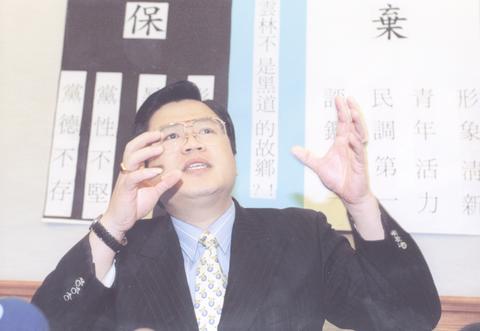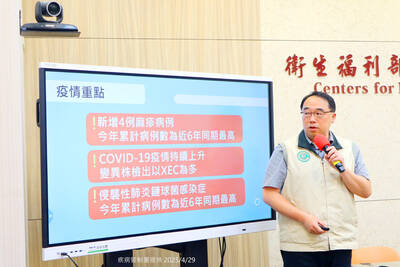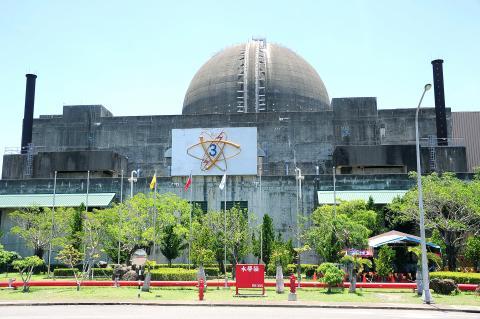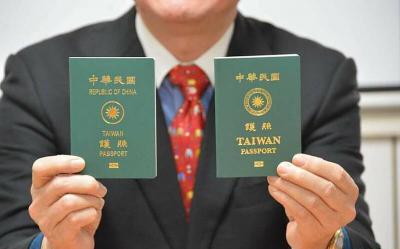Amid allegations of influence pedaling, KMT Legislator Hsu Shu-po (
DPP lawmakers have suggested that Hsu, a long-time member of the committee, lobbied on behalf of some illegal quarry operators along the Choshui River (

PHOTO: CNA
According to DPP Legislator Su Chih-fen (
Hsu, however, dismissed Su's allegations as "farfetched," saying he was the one who pushed through a set of strict regulations to control quarrying activities three years ago.
He also said he has worked with the police on numerous occasions to crack down on the illegal quarrying operations.
The recent accusations have not been the first time Hsu has aroused suspicion in his three terms as a legislator.
No stranger to controversy
Questions were raised about Hsu's role when it was disclosed that his family, who runs the Transworld Institute of Technology (環球技術學院), rents the institute's offices from the Taiwan Sugar Corporation for only NT$8 a ping. Hsu serves on the institute's board.
State-run enterprises are under the management of the Ministry of Economic Affairs and thus are subject to supervision by the Economics and Energy Committee.
Early start
Raised in a family with both political and business interests, Hsu was first elected a legislator in 1995 at the age of 32, winning 67,076 votes -- the highest number in his constituency in Yunlin County.
He set a record of becoming the youngest member of the KMT's Central Standing Committee in 50 years when he was first elected to the committee in 2000.
Analysts have generally attributed Hsu's early success to the extensive contact that his family has maintained with various local communities.
In addition to the support of the influential political clan established by his father, the clout enjoyed by Hsu's in-laws within the construction and tourism industries has been another valuable resource in his political career.
"Like most traditional politicians, he built his campaign network on the support of vote captains (
Hsu Shu-po's father, Hsu Wen-tsu (許文志), was commissioner of Yunlin County for eight years until he was appointed head of the Taiwan Provincial Government's Department of Reconstruction in 1990.
In 1994 he was promoted again, this time as the provincial government's secretary-general.
Hsu Wen-tsu held several other important government positions, including head of the KMT's Department of Organization and national policy adviser to former president Lee Teng-hui (李登輝), until his retirement in 2000.
Bumpy road
Hsu Shu-po's political climb has not been without setbacks.
Hsu failed his first legislative bid in 1992 by 1,000 votes.
In 1999, he vied for the KMT's nomination to run in the by-election for Yunlin County commissioner held after the death of commissioner Su Wen-hsiung (
The KMT first decided to nominate Hsu but later changed its mind, triggering strong protest from the legislator.
The opposition from local political factions in rivalry to the Hsu family was reportedly responsible for the twist, as there was anxiety among these factions that the political leverage of the Hsu family would continue to expand if Hsu won the position of commissioner.
Su Chih-fen, who was also elected from Yunlin County, said the decline in the number of votes won by Hsu in the legislative elections indicates that the influence of the Hsu family in Yunlin County is waning.
Compared with his overwhelming victory in 1995, the number of votes won by Hsu Shu-po dropped to 45,648 during his 1998 re-election bid. Last year, the number further slid to 31,886, making Hsu the winner with the least votes in Yunlin County.
Su attributed the downward trend to the controversies surrounding Hsu Shu-po.
"A key problem is the bus-inesses run by his family," Su said.

A fugitive in a suspected cosmetic surgery fraud case today returned to Taiwan from Canada, after being wanted for six years. Internet celebrity Su Chen-tuan (蘇陳端), known as Lady Nai Nai (貴婦奈奈), and her former boyfriend, plastic surgeon Paul Huang (黃博健), allegedly defrauded clients and friends of about NT$1 billion (US$30.66 million). Su was put on a wanted list in 2019 when she lived in Toronto, Canada, after failing to respond to subpoenas and arrest warrants from the Taipei District Prosecutors’ Office. Su arrived at Taiwan Taoyuan International Airport at 5am today on an EVA Air flight accompanied by a

COVID-19 infections have climbed for three consecutive weeks and are likely to reach another peak between next month and June, the Centers for Disease Control (CDC) said yesterday. Weekly hospital visits for the disease increased by 19 percent from the previous week, CDC Epidemic Intelligence Center Director Guo Hung-wei (郭宏偉) said. From Tuesday last week to yesterday, 21 cases of severe COVID-19 and seven deaths were confirmed, and from Sept. 1 last year to yesterday, there were 600 cases and 129 deaths, he said. From Oct. 1 last year to yesterday, 95.9 percent of the severe cases and 96.7 percent of the deaths

Restarting the No. 2 reactor at the Ma-anshan Nuclear Power Plant would take up to 18 months, Minister of Economic Affairs J.W. Kuo (郭智輝) said today. Kuo was answering questions during a meeting of the Legislative Yuan’s Economics Committee, where legislators are considering amendments to the Renewable Energy Development Act (再生能源發展條) amid concerns about the consequences of the Pingtung County reactor’s decommissioning scheduled for May 17. Its decommissioning is to mark the end of Taiwan’s nuclear power production. However, Chinese Nationalist Party (KMT) lawmakers have proposed an amendment to the Nuclear Reactor Facilities Regulation Act (核子反應器設施管制法) that would extend the life of existing

The Ministry of Foreign Affairs yesterday demanded that Somalia reverse its decision prohibiting Taiwanese passport holders from entering or transiting through the country. Somalia said it is following the “one China” principle based on UN Resolution 2758. The ministry said that Somalia is misinterpreting the resolution under China’s instigation, creating a false impression that Taiwan is subordinate to China. The Somali Civil Aviation Authority told airlines on Tuesday last week that starting today, any passengers with passports or travel documents issued from Taiwan or its affiliated institutions would not be allowed to enter or transit through Somalia. The decision comes as Taiwan is boosting